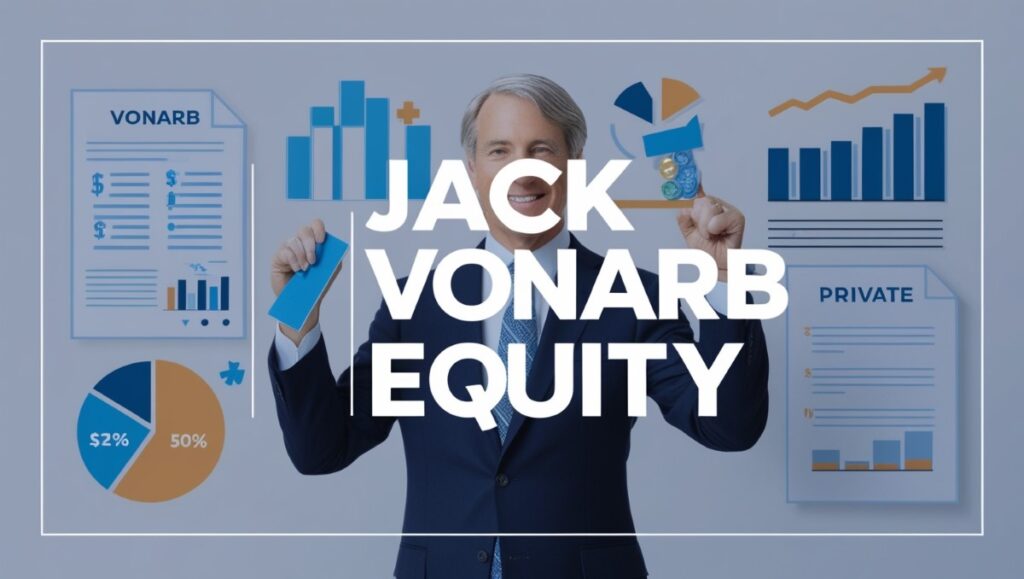Private equity is a term that often sparks curiosity and intrigue among investors. For many, it represents an exclusive world filled with high-stakes deals and immense financial opportunities. Yet, for others, it can seem daunting or shrouded in mystery. Enter jack vonarb privare equity—a name synonymous . His unique strategies have revolutionized how individuals approach investment in this sector.
Whether you’re a seasoned investor looking to diversify your portfolio or a newcomer eager to understand the landscape better, there’s much to learn from Vonarb’s experience and insights. In this article, we’ll explore what private equity is all about, delve into the influence of Jack Vonarb on modern investing practices, and provide you with essential tips for navigating this complex field successfully. Join us as we unravel the secrets behind successful private equity investments!
The Influence of jack vonarb privare equity
Jack Vonarb has carved a notable niche in the world of private equity. His strategic approach and keen insights have influenced many investors looking to navigate this complex landscape.
Vonarb’s emphasis on thorough due diligence sets him apart. He believes that understanding every facet of a potential investment is crucial for long-term success.
Another aspect of his influence lies in his ability to identify emerging trends. Whether it’s technology or sustainable energy, he has an eye for opportunities others might overlook.
Moreover, Vonarb advocates for building strong relationships with portfolio companies. This focus on collaboration often leads to enhanced performance and value creation.
His vision encourages new entrants into private equity to think differently about their investments. By fostering innovation and adaptability, Jack Vonarb continues to shape the future of this sector.
Advantages and Disadvantages of Private Equity Investing
Private equity investing comes with its own set of advantages. One significant benefit is the potential for high returns. Investors can often achieve substantial growth compared to traditional markets. This allure draws many into the private equity arena.
However, it’s not without risks. The illiquidity of investments can be a major drawback. Unlike stocks, private equity investments typically lock in capital for extended periods, limiting access to funds.
Another advantage is the ability to influence company operations directly. Private equity firms often bring expertise and strategic guidance that can drive performance improvements.
Yet, this involvement demands diligence and time commitment from investors. Thorough due diligence is essential but requires resources that some may lack.
Understanding both sides helps navigate this complex landscape more effectively while managing expectations along the way.
Common Strategies Used in jack vonarb privare equity
Private equity firms employ various strategies to maximize returns on their investments. One common approach is leveraged buyouts (LBOs), where a firm acquires a company using significant debt financing. This allows for substantial ownership with lower initial capital.
Another strategy involves growth capital, which focuses on investing in established companies poised for expansion. Here, private equity provides the necessary funds while leveraging operational expertise to drive performance.
Venture capital also plays a crucial role. These investments target early-stage startups with high growth potential but come with increased risk.
Distressed asset acquisitions are another notable tactic. Firms purchase struggling businesses at discounted prices and work towards revitalization through strategic management changes.
Secondary buyouts occur when one private equity firm sells its portfolio company to another firm, allowing investors to realize returns while continuing the company’s development journey. Each of these strategies requires careful analysis and execution tailored to specific market conditions.
Key Factors for a Successful Investment in Private Equity
Successful investment in private equity hinges on several critical factors.
First, thorough due diligence is essential. Investors must assess a company’s financial health and market position before committing capital. Understanding the nuances can make or break an investment.
Next, consider the management team’s experience and track record. Strong leaders with proven results often steer companies toward growth and profitability.
Diversification also plays a vital role. Spreading investments across various sectors reduces risk while enhancing potential returns.
Additionally, patience is crucial in this realm. Private equity investments typically require time to mature, so investors should prepare for a long-term commitment without expecting immediate gains.
Maintaining open communication with fund managers fosters trust and transparency throughout the investment journey. This relationship can provide valuable insights into strategic decisions that may impact performance down the line.
Tips from Jack Vonarb for New Investors in Private Equity
Jack Vonarb emphasizes the importance of thorough research. Understanding the industry and specific companies can make a significant difference in investment outcomes.
He also advises new investors to build a strong network. Connecting with seasoned professionals provides invaluable insights and guidance.
Patience is crucial in private equity, Vonarb notes. Investments often take time to mature, so it’s essential not to rush decisions based on short-term market fluctuations.
Risk management should be at the forefront of every investor’s strategy. Diversifying portfolios helps mitigate potential losses while maximizing opportunities for growth.
He encourages continuous learning. The private equity landscape evolves rapidly; staying informed about trends and innovations will empower investors to make smarter choices over time.
Conclusion:
Private equity represents a fascinating investment avenue that has the potential for significant returns, albeit with its own set of risks. Understanding Jack Vonarb’s approach to this complex field can provide valuable insights for both seasoned investors and newcomers alike.
Vonarb’s influence in private equity is not just about his successes but also his strategies and philosophies. Investors must weigh the pros and cons carefully before diving into this arena. By grasping common strategies utilized in private equity, you enhance your ability to navigate through various opportunities effectively.
Key factors such as market timing, thorough due diligence, and understanding industry trends are crucial for securing successful investments in private equity. Jack Vonarb emphasizes these elements consistently throughout his career.
For new investors looking to break into this space, taking tips from experts like Vonarb can be incredibly beneficial. His practical advice offers a roadmap that could lead to fruitful ventures down the line.
The world of private equity awaits those ready to explore its depths. With informed decision-making guided by insights from leaders like Jack Vonarb, there lies an exciting opportunity ahead for all aspiring investors who dare to take the plunge into jack vonarb private equity investing.



